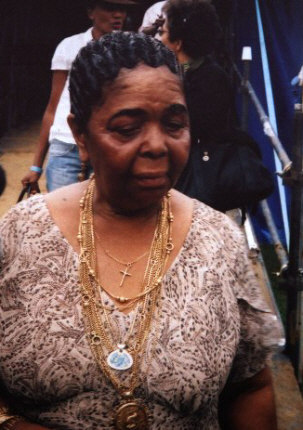|
|
Cesaria
Evora, popularly known as Cize, was born in 1941 in the port
town of Mindelo on the Cape Verde island of Sao Vicente - one
of her albums is called Sao Vicente. She became internationally
famous when she was in her late 40s and has recorded around
15 albums. To understand the style of her music one should read
about the history of the islands:
The Portuguese arrived on these 10 uninhabited islands in 1460,
populated them with Africans and Europeans, and governed harshly.
The islands are in the Atlantic Ocean, 350 miles off the coast
of Senegal (it takes 2 hours to go by air), were one of Africa’s
first slave ports, and became one of its last nations to achieve
independence in 1975. All this explains why the melancholy morna,
sung in Creole-Potuguese about love, loss and sadness, is very
much part of the Cape Verdean national identity and Cesaria
is a true ambassadress.
Cesaria’s father was a violinist and though she does not
remember him because he died when she was 7, her grandmother
says that Cesaria used to sit on his lap while he played. Surrounded
by music, she grew up singing with her friends in the suburbs
of Mindelo. When she was 16, a boyfriend who played guitar convinced
her that she had an exceptional voice and encouraged her to
pursue music as a profession. After that Cesaria recorded some
songs for the national radio station, and began to build a reputation.
She idolized Mahalia Jackson, Billie Holliday and fado singer
Amalia Rodriguez.
In the colonial times Cesaria developed a modest career performing
in bars and restaurants, and sometimes in the homes of wealthy
Portuguese colonialists. After Cape Verde achieved independence
in 1975, many of the Portuguese aristocracy fled the new socialist
government so Cesaria had very few occasions to perform.
Then in 1985, a Cape Verdean women's organization asked her
to record 2 songs for a compilation CD. She went to Paris to
record, and while there played some concerts. Her success in
Europe was absolutely phenomenal.
Cesaria performs with closed eyes and bare feet, which she calls
part of the 'national costume' of Cape Verde. She says that
when she sings, memories play
in her head transporting her to other times and places.
Evora
has a certain fondness for cigarettes and whiskey, paying no
|

attention
to any claim
that these might harm her voice. "I've had plenty of time
to ruin my voice," she says. "And since it's not ruined
yet, I'm going to continue." Her songs are filled with
longing
and sadness with the acoustic sounds of guitar, cavaquinho,
violin, accordian, and clarinet.
"Morna is like the blues because it is a way to express
life's suffering in music." Cesaria is known as the barefoot
diva because she appears on stage in her bare feet in support
of the disadvantaged women and children of Cape Verde. Another
of her albums is La Diva aux Pieds Nus, made when she
was 47. Understanding her lyrics is not necessary because one
can sense the emotions in her performances. Now a grandmother,
Cesaria continues
to record and tour and is happy about her worldwide popularity,
"... in all those years when I sang in bars and in front
of strangers I sometimes had an idea I might someday be successful
outside my country. The thought never stayed with me for very
long, but here I am."
Her
songs appear on numerous album compilations including 'Quem
pode' with Teofilo Chantre (her guitarist) on Drop the Debt.
There seems to be a strong
link with Angola, perhaps because of Portuguese, for example
Bonga sings one of Cesaria’s well-known
songs, 'Sodade' (meaning Nostalgia). Cesaria has dueted with
many artists: Salif Keita for the song 'Yamore' on the album
Moffou and on her album Rogamar (2006) Ismael
Lo joins her for 'Africa Nossa'. Both these and a host of others
(a total of 19) make up the compilation Cesaria Evora &
... (2010).
After suffering ill health in 2010, in September 2011 Cesaria
had to retire due to poor health. Tnen on 17th December 2011,
aged 70, she died. Two days of national mourning were held in
honour of the queen of Morna.
|
![]()